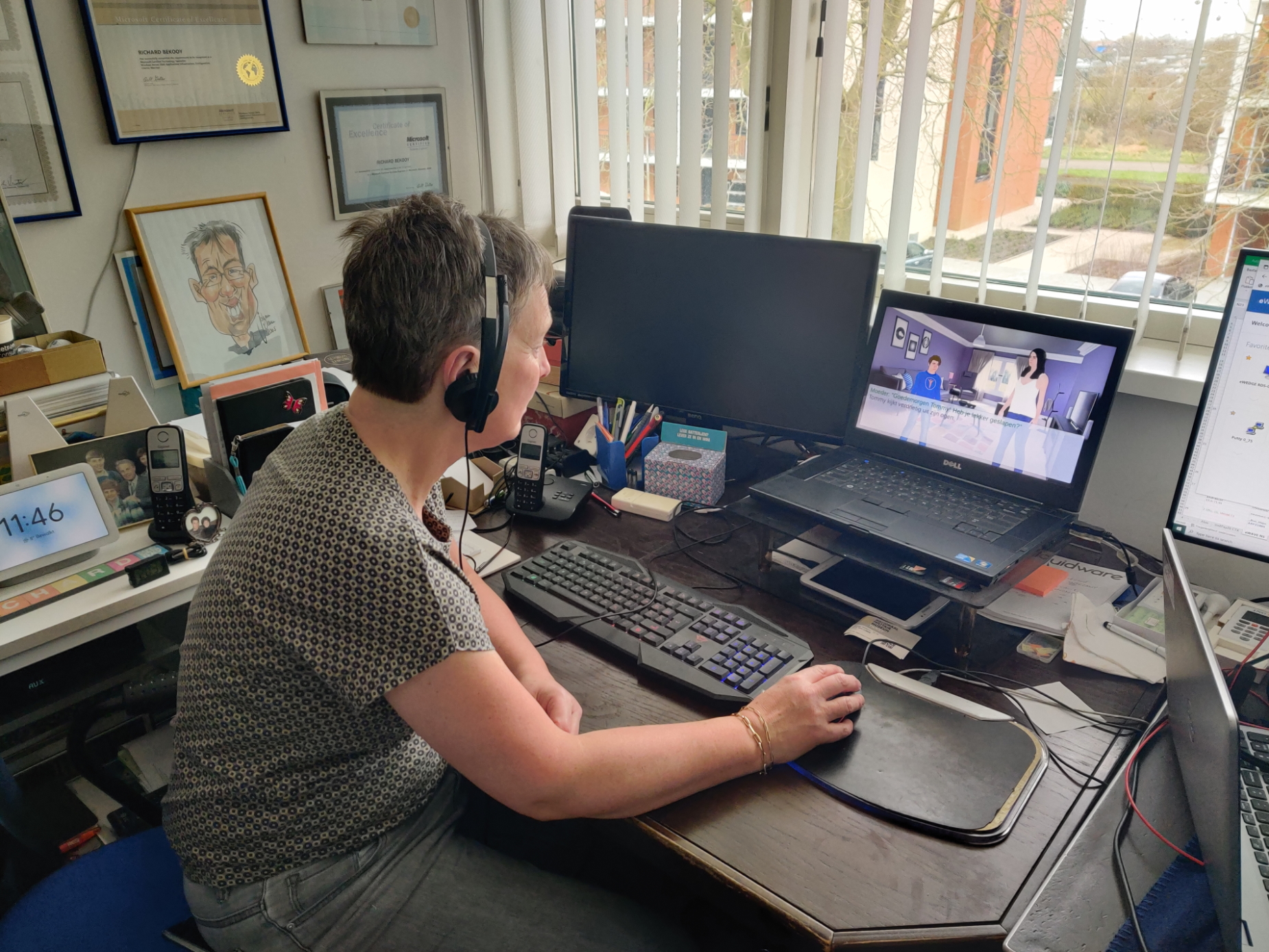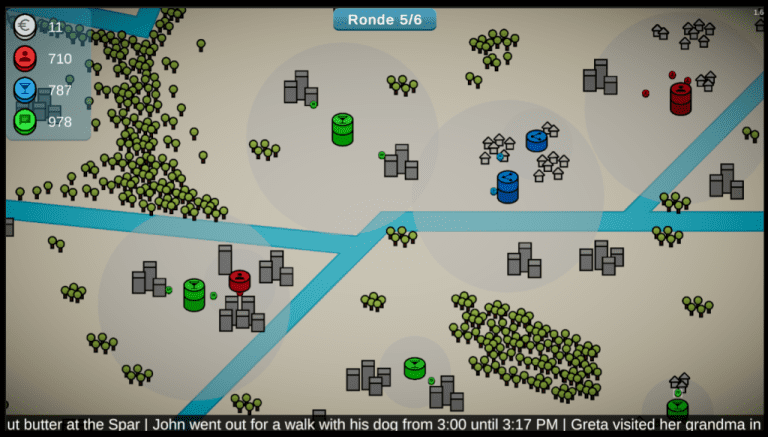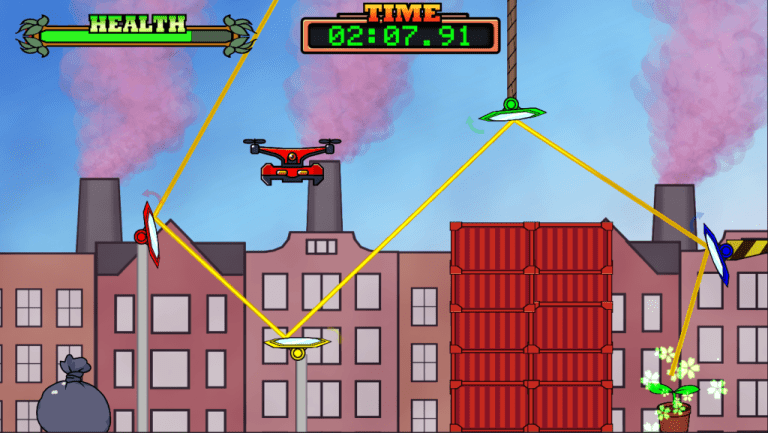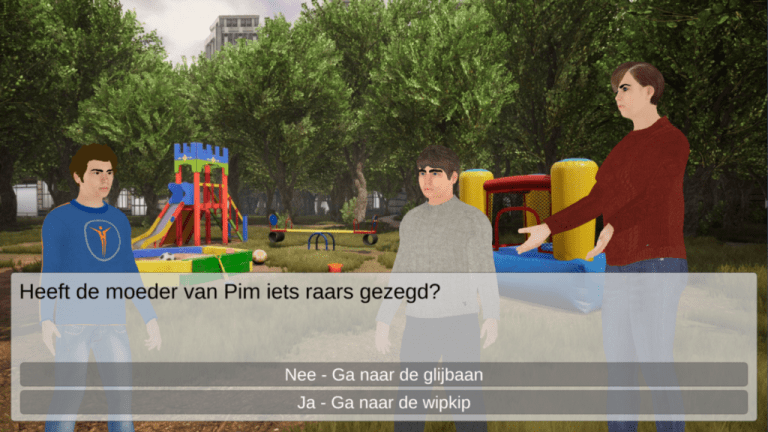From big data and recognising dementia to a collaboration test: eight student teams worked on serious computer games for 10 weeks. What did they make?
A test participant plays the serious game Tommy's Quest. (Photo: Team Tommy's Quest)
For the Building Serious Games master’s subject, 43 students in teams of five or six took on the task of designing games. Master students throughout TU Delft could take part. The request to build a game came from different sources such as the University of Leiden, TU Delft’s Robotics Institute and a software company called Game Tailors. At the end of January the students showed their prototypes during a presentation at the Faculty of Electrical Engineering, Mathematics and Computer Science (EEMCS).
Half the assignments were related to mental health problems, says Dr Rafael Bidarra, Course Coordinator and Computer Science teacher at EEMCS. “Though that was mostly coincidental. The games were about dementia, social anxiety, and the cognitive load on the brain.”
Bidarra is happy that his subject attracted more students than last year: 43 instead of 25. But he does believe that the group would benefit from greater diversity. “Most students are studying Computer Science. But not everyone in the team needs programming knowledge as the project is highly diverse. It is just like a small game studio where everyone has their own unique role.”
Curious about what the students made? Three of the eight projects are described below. Click on the pictures to see a game play video the teams made:
Little Big Data: awareness raising of big data
What is the best neighbourhood to run a campaign for a particular political party? Where did a flu pandemic start? And what are the best items to sell in a sports shop?
The Little Big Data game helps players answer these kinds of questions. They collect three types of data: personal information, location data, and online information. The information is collected by placing cell towers in the right places. This game is aimed at secondary vocational education students, making them more aware of the opportunities as well as the dangers of data collection, such as making wrong links.
Mirrors: smog city – a test of collaboration
In Mirrors: Smog City each player only has one button to press which gives him/her control over a mirror. The players have to avoid obstacles and jointly make sure that a ray of sunshine is directed on one plant. If they manage it, the plant grows and they move to the next level.
This game allows you to measure the collaboration skills of a team. All the players are required to cooperate to achieve the goal.
As the players use a simple control device with just one button, the game is also suitable for people who are less familiar with computer games.
Tommy’s Quest – detecting dementia
While Tommy goes looking for his lost cat, he walks past the playground, supermarket and his school. Players see a conversation between Tommy and others in each place. After that the players are asked if there is anything odd about the situation.
Tommy’s Quest is intended to detect frontotemporal dementia. This is a form of dementia in which the brain cells in the language and behaviour areas die. It can emerge from a young age.
The current tests for the condition only briefly describe a situation and then ask one question. They give little context and that makes it hard for a person with suspected dementia to do. Tommy’s Quest solves this by giving one story with different parts in the form of a game. This makes is easier to place yourself in the game.
After the prototype is presented, the people who commissioned the prototype still sometimes continue working on the product, says Bidarra. “Last year students built two natural environments in 3D. The goal was to see if virtual nature can also have a positive effect on health.” The University of Leiden continued the research and presented it at an international psychology conference. “Once in a while clients even appoint students of the subject as student assistants or programmers in research like this.”
The games that the other five teams made were the following (click on the link for a video):
- In Astral Body you control a virtual version of your own arm. The question that guided the team is under what circumstances does this arm feel like your own arm?
- Sociable is a game in which people with social anxiety disorders can practice social situations in a game environment.
- If you think hard, the size of your pupils changes. The makers of the Bomb disposal measure the size of the players’ pupils. That data can be used to adjust the level of a game in the future.
- In Novel Environments you walk for a set amount of time through a digital environment such as woods or a desert. Researchers keep track of what you do in that time period.
- PlantDefence is a game on a novel transparent screen, placed on a window and controlled via their mobile phone. Players should protect virtual plants from insects by clicking in the right place.
Do you have a question or comment about this article?
K.S.vanderWal@tudelft.nl





Comments are closed.